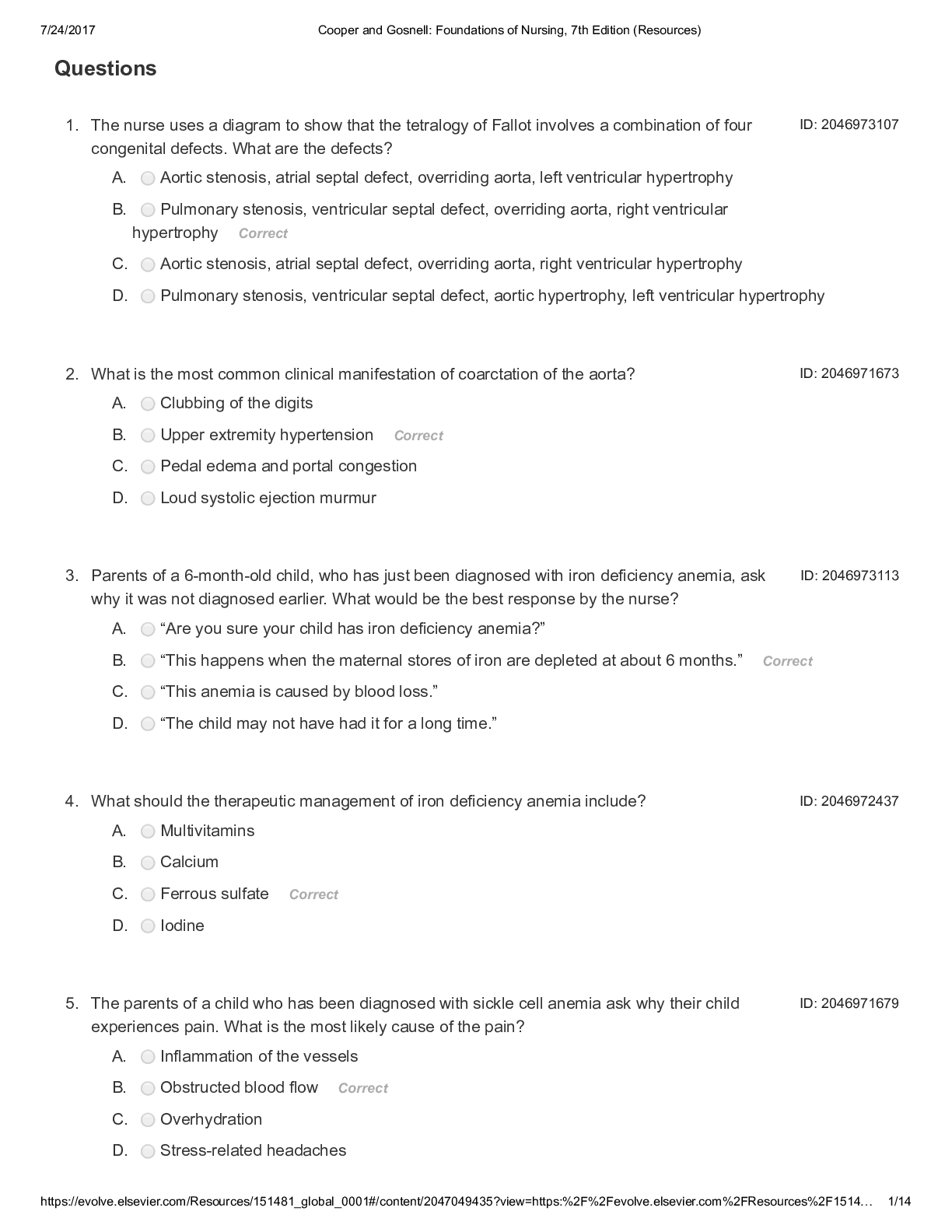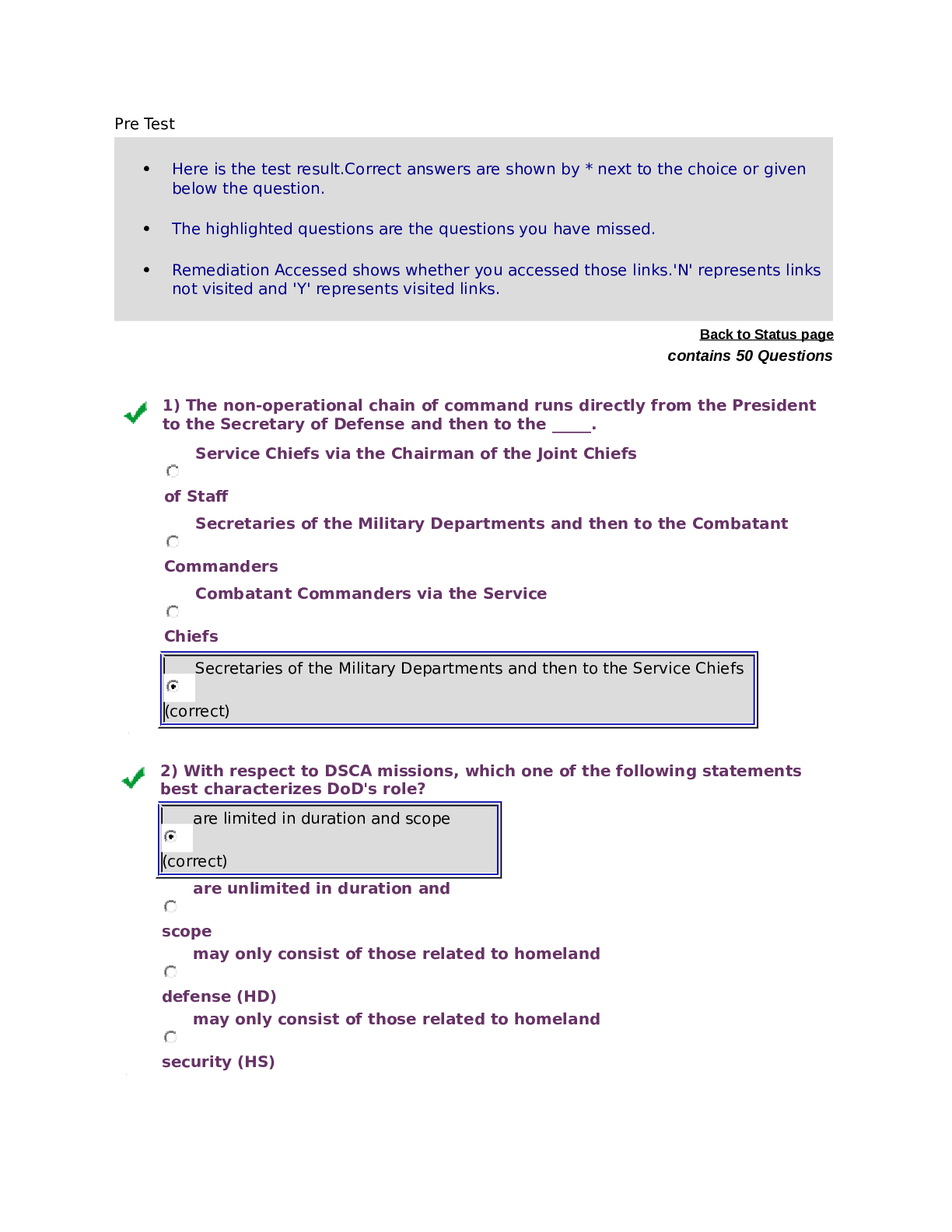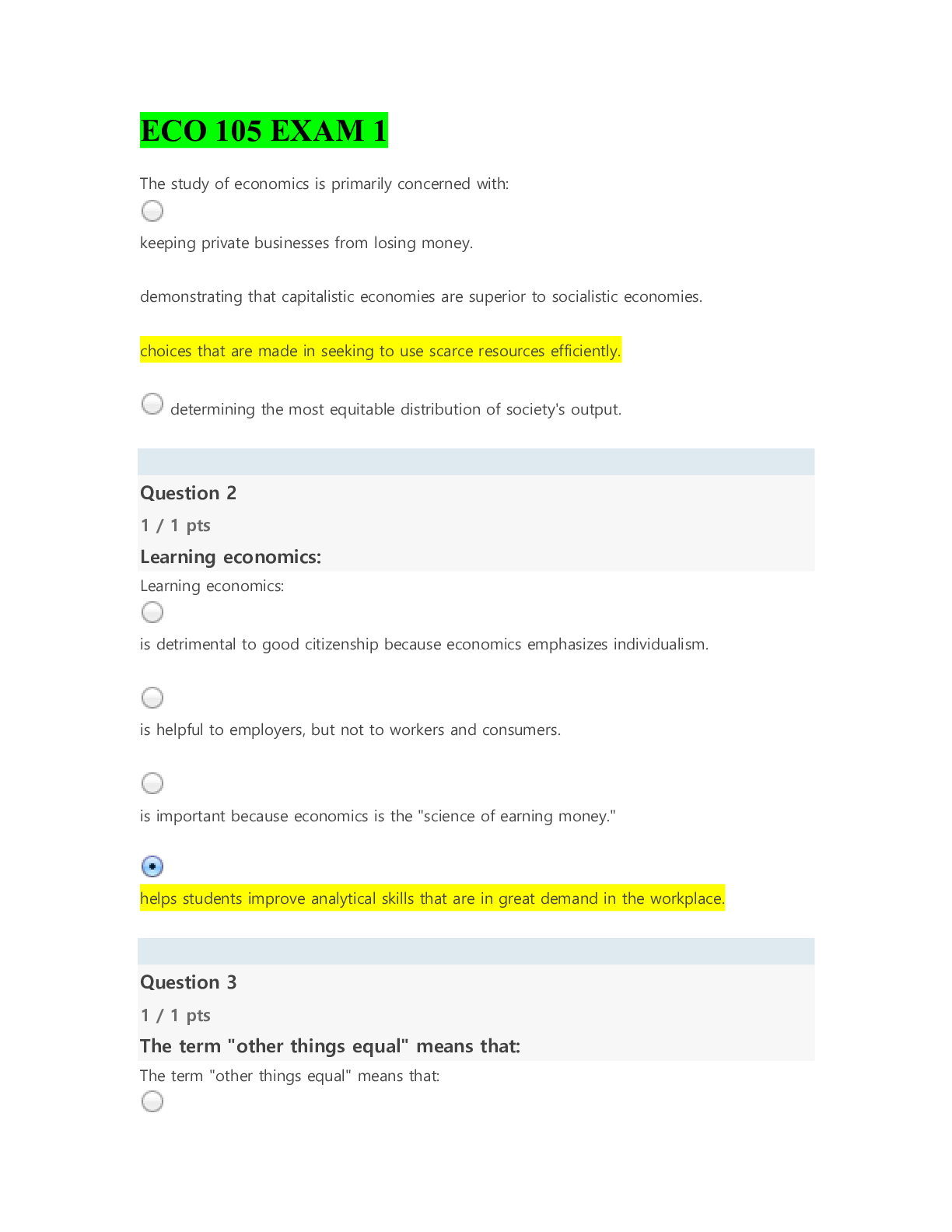C157 Study Test Questions and Answers,100% CORRECT
Document Content and Description Below
C157 Study Test Questions and Answers 1. The surgery department’s monthly case review revealed the need for the development of a new innovation to better meet surgical patient outcomes. Which of th... e following would the Advance Practice Nurse need to consider having as part of the innovation committee? 2/2 Surgical technician, risk manager and surgeon Surgeon, scrub nurse and patient Referring physician, circulating nurse and patient Surgeon, risk manager and scrub nurse 2. An MSN needs to assign a staff member to assist a medical director in the development of a quality program for a newly established service. Which of the following staff members is most appropriate for this project? 2/2 a newly hired staff member who has demonstrated competence and has time to complete the task a motivated staff member who is actively seeking promotion a competent staff member who has good interpersonal skills a knowledgeable staff member who works best on defined tasks 3. The MSN leader is regularly monitoring the number of inappropriate referrals, the timeliness of discharge planning, and the number of days of discharge delays. What additional monitor should the MSN leader recommend to the Discharge Planning Team to be added to the process for evaluating the appropriateness of discharge planning interventions? 0/2 adequacy of documentation in progress notes attainment of discharge planning goals timeliness of referrals to discharge planning number of discharge planning referrals from nursing Correct answer attainment of discharge planning goals 4. Pharmacy Services and Nursing are having difficulty developing an action plan for medication errors. Pharmacy Services states that Nursing Services cause the majority of the problems related to errors, while Nursing Services states the opposite. The MSN Leader’s role in resolving this problem is to: 2/2 provide them with directives on how to solve the problem facilitate discussion between the groups to enable them to assume ownership of their portions of the problem assign the task to an uninvolved manager refer the problem to the facility-wide quality council 5. In beginning a new quality improvement innovation, the designated committee identifies a need for change in the medication reconciliation process, and creates a new documentation form that covers all essential elements of the process. The committee also develops a way to assess monthly compliance with use of the new form. These tasks represent which step of the PDSA model? 2/2 Planning a change. Pilot testing a change. Implementing a tested change. Sustaining a change. 6. An acute care hospital wants to change their information sharing policy. They currently share the following information with patients only: diagnoses, care planning, medications, activity, and discharge information. The change to the HIPAA privacy policy will enable personal health information to be shared with any person a patient designates permission to have access. Clinical staff members are concerned because expanding access to patient information will result in additional cross-checking work prior to being able to direct visitors to answer questions about a patient's care. Hospital administration is considering this change as a way to enhance patient- centered care. How should this change be evaluated to determine if it is successful? 2/2 compare quality care metrics of medication reconciliation pre-policy and post-policy change compare quality care metrics between the acute hospital and the skilled nurse facility compare patient satisfaction metrics between pre-policy and post-policy change compare clinical staff satisfaction metrics between pre-policy and post-policy change 7. As part of the new innovation on the medication reconciliation process, three nurses on different shifts are using the new medication reconciliation form. This task represent which step of the PDSA model? 2/2 Planning a change. Pilot testing a change. Implementing a tested change. Sustaining a change. 8. As part of the new innovation on the medication reconciliation process, all nurses on the units begin using the new medication reconciliation form. Using the PDSA model, this is an example of: 2/2 Planning for a change. Pilot testing a change. Implementing a tested change. Sustaining a change 9. An acute care hospital wants to reduce readmission rates based on medication reconciliation and non-compliance. When charged with developing an innovation regarding educating patients on discharge medications, who would be best to designate the leader for this clinically-based innovation? 2/2 Social Worker Advance Practice Nurse Physician Pharmacist 10. In reflecting on the role of MSN mentor, which of the following statements is not true? 0/2 The mentor nurtures and develops the mentee’s capacity for self-reflection and self-direction. Mentoring relationships are task focused; when the tasks are completed the relationship comes to a close. A mentor who understands how to provide vision and how to support and challenge the mentee can help the mentee grow and develop. The mentoring relationship is a learning partnership that focuses on developing the mentee’s abilities and thinking. Some preceptors are also mentors; being a mentor is not dependent on being a preceptor. Correct answer Mentoring relationships are task focused; when the tasks are completed the relationship comes to a close. 11. The MSN leader knows that by focusing on the patient, the Quality Improvement (QI) team can achieve the IHI Triple Aim. The Triple Aim is, simply stated, to create: 2/2 Better outcomes, great patient experiences, and reduced costs Higher revenues, reduced turnover, and lower costs Better outcomes, reduced costs, and higher revenues Lower revenues, higher costs, and lower patient satisfaction 12. In interpreting the run chart below, all of the following are true except: 0/2 More than a year of data is represented in the chart. The highest rate of infection reported was about 8%. The data points in red indicate a rise in infection rates from April through December. The data points in green indicate a decrease in infection rates over two separate time periods. The green dotted line is located at about a 4.5% infection rate; this is the target or benchmark. The blue dotted line is located at about a 3% infection rate; this is the target or benchmark. Correct answer The green dotted line is located at about a 4.5% infection rate; this is the target or benchmark. 13. The following diagram below is best described as a: 0/2 Run chart Flow chart Control chart Checklist Correct answer Flow chart 14. The Advanced Practice Nurse (APN) is the leader of a committee task with preparing to implement an Electronic Medical Records (EMR) system within the organization. Which of the following steps is often overlooked during planning of an innovation? 0/2 Making long term optimization of the EMR a routine part of the organization activity. Identify metrics to measure success of the EMR implementation. Training all employees involved in implementing the EMR. Determining possible barriers to the implementation of use of the EMR. Correct answer Making long term optimization of the EMR a routine part of the organization activity. Feedback 15. The MSN leader is responsible for reviewing treads in patient care. The primary purpose of an information management system for this task is to allow the MSN leader to: 2/2 look at individual patient records allow for centralize demographics reduce cost of supplies used evaluate several aspects of data sets 16. The MSN leader is charged with ensuring quality patient care is provided on the unit. Which of the following monitors provides the best data set for determining patient outcome information? 2/2 healthcare-acquired infection rate nursing care documentation compliance antibiotic therapy discontinuation compliance equipment malfunction rate 17. An interprofessional team comprised of a hospitalist, nurse practitioner, pharmacist, registered nurse, social worker and discharge manager are caring for a six-year-old being treated for status asthmaticus. Prior to admission, the patient required several recent Emergency Room (ER) visits and hospitalizations with missed outpatient sub-specialty appointments. The patient was noted to be overweight and counseling was provided at the last outpatient appointment. Which aspect of the patient’s care should be the priority for the Nurse Practitioner? 0/2 refer the patient to a respiratory specialist to assess the parents understanding of the asthma action plan work collaboratively with each member of the Interprofessional team to address the patient’s health concerns consult with the Social Worker to address the frequent ER visits and hospitalizations with multiple missed sub specialty appointments ensure the Interprofessional team focuses on the patient adherence to weight management and nutritional counseling Correct answer work collaboratively with each member of the Interprofessional team to address the patient’s health concerns 18. The MSN is aware that the primary purpose of an information management system is to allow an organization to: 2/2 save time centralize demographics evaluate data reduce cost 19. During the quality improvement process, the MSN leader utilizes flowcharts to track the process being reviewed. The primarily use of a flowchart in quality improvement is to: 0/2 analyze causal factors of process dispersion understand the overall process or system being audited distinguish variations in a process over time determine process capability and uniformity Correct answer understand the overall process or system being audited 20. The MSN leader is responsible for the financial needs of the department. Before selecting a vendor of a particular healthcare equipment or supply, which of the following should the MSN leader do first? 2/2 Conduct vendor surveys. Define departmental needs. Determine which vendors are industry leaders. Get feedback from team members about how various vendors and their supplies are performing. Decide which vendor is most cost effective. 21. The MSN leader is responsible for any unit specific training that is required for the staff. Which of the following is a priority for the MSN in the planning of quality improvement training? 0/2 Establishing specific training evaluation tools. Developing short-term training plans. Scheduling training for managers. Connecting training to organizational needs. Correct answer Connecting training to organizational needs. 22. The MSN leader is accountable for the quality and safety of the unit. In the development of effective, quality initiatives, all of the following aspects must be present except for: 2/2 Initiatives need to be developed by stakeholders. Initiatives are influenced by cost and profit considerations. Initiatives are an integral part of the overall organizational strategic plan. Initiatives will only address the needs of a specific population of patients. 23. Which of the following is not an appropriate goal for quality improvement education of the Master level graduate? 2/2 Develop an understanding of the fundamentals of quality. Integrate quality into decision-making processes. Define the chain of command for approving quality procedures. Provide tools and information to help MSNs build and utilize quality systems and processes. 24. The MSN leader is designing a professional development program for the unit staff. Utilizing the “AIM” process, rank the order, from first to last, of training design steps. 2/2 Prepare the training materials, define the training objectives, determine the course structure and sequence, Establish the consensus on needs. Define the training objectives, determine the course structure and sequence, establish the consensus on needs, prepare the training materials. Establish the consensus on needs, define the training objectives, determine the course structure and sequence, prepare training materials. Determine course structure and sequence, prepare the training materials, define the training objectives, and establish the consensus on needs. 25. The MSN leader wants to implement Leadership Rounds in the hospital, to include participation of the Chief Executive Officer (CEO). This initiative would provide an informal way for senior leaders to talk with front-line staff about safety issues in the organization and to encourage reporting of errors. All of the following are benefits of having the CEO involved in these rounds except: 0/2 Increased understanding by the CEO of the organization’s state of affairs. Improved motivation of subordinates through personal participation of the CEO. Improved human relations between the CEO and front line staff. Improved dissemination of information throughout the organization. Correct answer Improved dissemination of information throughout the organization. 26. In order to be successful in the role of change agent, an MSN leader’s responsibilities should include all the following except for: 0/2 Understand and respect needs of others. Communicate change initiatives only to senior management. Learn from previous unsuccessful efforts to transform the organization. Maintain commitment to the mission and vision of the organization. Correct answer Communicate change initiatives only to senior management. 27. The MSN leader is developing an initiative to improve the quality of care of the unit. Which of the following is the first priority when starting a quality improvement initiative? 2/2 Assign team member’s assignments prior to the first meeting. Develop the strategies that the team will implement. Identify the objective of the quality initiative. Make sweeping organizational changes to support quality initiative. 28. The MSN leader is analyzing collected data for a quality improvement initiative. The MSN is aware that if data is plotted over time, the resulting chart will be which type of chart? 2/2 Run chart Histogram Pareto chart Poisson distribution 29. The roles and responsibilities of a quality improvement team should be established by which of the following company authorities? 2/2 The board of directors The human resources department The team members’ supervisors The quality improvement committee 30. The MSN leader is aware that which of the following should be included during the planning stage for quality training? 0/2 Establishing specific training quotas Developing short-term training plans Scheduling training for managers Connecting training to organizational needs Correct answer Connecting training to organizational needs 31. As the leader of the Quality Improvement committee, the MSN is aware that which of the following is one advantage of group decision-making? 2/2 Ease of arriving at a decision Reduced potential for conflict Increased acceptance of decisions Increased productivity 32. For organization-wide change to be effective, the most important condition the MSN leader needs to meet is to have which of the following? 0/2 Coordination between employees and management Agreement between line and staff functions Alignment between strategy and goals Consistency between individual and team performance Correct answer Alignment between strategy and goals 33. To be effective, the MSN leader is aware that quality initiatives must be: 0/2 Developed by stakeholders. Free from cost and profit considerations. An integral part of the overall organizational strategic plan. A&C All of the above Correct answer A&C 34. The master’s prepared nurse is leading a quality improvement team in the development of a new admission process for a healthcare organization. The team has determined what constitutes best practices for admissions and has developed its recommendations. What should the team do next? 2/2 The team should propose an organization-wide implementation of the new process. The team should develop the information sheets about the new admission process. The team should complete a pilot test of the new admission process. The team should work with clinical educators to roll out the new process. 35. The Advance Practice Nurse (APN) led an interdisciplinary team that planned and implemented an evidence based program to decrease patient falls. Data analysis reveals that the number of falls prior to implementation was 15 and the number falls after implementation of the plan was 10. The overall goal was to have a 20% decrease in the number of falls. How should the APN interpret this data? 2/2 The goal was not met with an improvement of 66% The goal was met with an improvement of 33% The goal was met with an improvement of 20% The goal was not met with an improvement of 15 % 36. In order to be successful in the role of change agent, the MSN leader is aware that which of the following is the first priority when starting a quality improvement initiative? 2/2 Assign team goals. Develop planning strategies. Identify an aim. Implement organizational-wide changes to support quality. 37. As the leader of the Quality Improvement Committee, the MSN knows that which of the following is the least effective safety approach for a patient-centered healthcare organization to take? 2/2 Urge employees to do it right the first time. Establish a quality council that includes patients. Implement team-building throughout the organization. Examine processes and establish controls to increase efficiency, reliability, and safety. 38. An advanced practice nurse for the nursing unit in a hospital identified the problem of increased sepsis rates related to intravenous lines. Which step represents the "Plan" component of the PDSA cycle for the process improvement team? 2/2 Compare sepsis rates to rates found on other units Review the literature for evidence-based guidelines for sepsis care Review antibiotic therapies of patients throughout the hospital Culture intravenous insertion site on the unit patients 39. When analyzing data sets, the MSN is aware that the wide scale collection of patient’s weight into a large data set is primarily used to measure and improve healthcare for which type of group? 2/2 Family health Extended family health Population health Individual health 40. A medical-surgical unit in an acute care hospital has identified the problem of increased sepsis rates during the last quarter. What is the next step in the PDSA cycle? 2/2 Evaluate changes in patient’s condition Evaluate the effectiveness on the plan Implement the sepsis interventions that are easily accessible on the nursing unit Review the data and develop an evidence-based plan 41. Which domains of benchmarks must be considered when evaluating evidence for use in a healthcare setting innovation? 2/2 Quality, differing types of studies, narrow results Biases, quantity, usefulness of results Quality, quantity, and consistency Selection, type of studies, broad results 42. What must the MSN leader ensure has been considered before implementing an innovation in care provided to patients? 2/2 Staff qualifications Family preferences Administrative expectations Patient safety 43. The MSN is leading a quality improvement team working to identify the primary drivers of patient satisfaction regarding the nursing care the patient’s receive. One of the identified primary drivers of patient satisfaction identified was effective communication. What is the first thing the quality improvement team should do with this information? 2/2 Remind staff of the importance of effective communication Establish a means for measuring effective communication Implement an organizational-wide program for effective communication Develop strategies for teaching staff effective communication 44. During the Quality Improvement (QI) process, data reveals that overall patient satisfaction scores are 72% for the first quarter and 69% the second quarter. The organizational goal is 80%. Which action should the advanced practice nurse take utilizing the PDSA cycle? 2/2 Implement a pilot program on a unit to address the decrease in scores Plan an evidence based intervention to address the declining scores Continue to monitor the scores during the next quarter Implement an organizational-wide program to address the score. 45. The Quality Improvement (QI) committee implements a program to improve shared decision making between patients and nursing staff. The MSN is aware that which national benchmark would best evaluate the effectiveness of the program? 0/2 Quality & Safely Education in Nursing (QSEN) Hospital Consumer Assessment of Healthcare Providers & Services (HCAHPS) Essentials of Master's Education in Nursing Plan, Do, Study, Act Model (PSDA) Correct answer Hospital Consumer Assessment of Healthcare Providers & Services (HCAHPS) Feedback 46. A nurse executive leader sponsors a multidisciplinary team that is charged with educating patients scheduled for total joint replacement surgery, about topics including what to expect after discharge. What is the nurse executive's response when encountering resistance from team members? 2/2 Direct the mid-level managers to reemphasize the vision to their direct reports Encourage the first-level managers to reinforce the vision to the team members Gather together the various disciplines and listen to their concerns about the project Reeducate the team members about how their role affects the outcome of the team 47. The MSN is leading a committee in a large urban hospital appointed to plan improvements in patient care. Which of the following should the MSN chose to be on the inter-professional committee: 2/2 chief nursing officer (CNO) and the chief medical officer (CMO). the institution's strategic planning committee members. representatives from medical, nursing, and ancillary staff personnel. senior management and the budget adviser. 48. Which of the following does not describe examples of barriers to patient safety? 0/2 Persistent fear and hierarchical authority Complexity and deficient measures Reporting systems and safety culture Diffuse accountability and lack of leadership Correct answer Reporting systems and safety culture 49. One of the essential roles of the MSN is to be an effective member of the inter- professional team. As a part of the inter-professional team, what action should the MSN nurse do first? 2/2 obtain employment that requires graduate preparation. develop awareness of personal skills and abilities. establish a mentor relationship with an Advance Practice Nurse. Participate in formal continued education. 50. A 42-year-old mentally challenged patient has been admitted to the hospital for treatment of a chronic illness. The patient has been determined legally incapable of making decisions since childhood and depends on her parent for medical assistance. During her hospitalization, the patient’s parent suddenly passes away and there is no one else for support while the patient is in hospital. The MSN leader understands that which of the following would be the best advocate to help this patient? 0/2 the nursing team the administrative staff the clergy the medical team Correct answer the nursing team [Show More]
Last updated: 1 year ago
Preview 1 out of 35 pages
Instant download
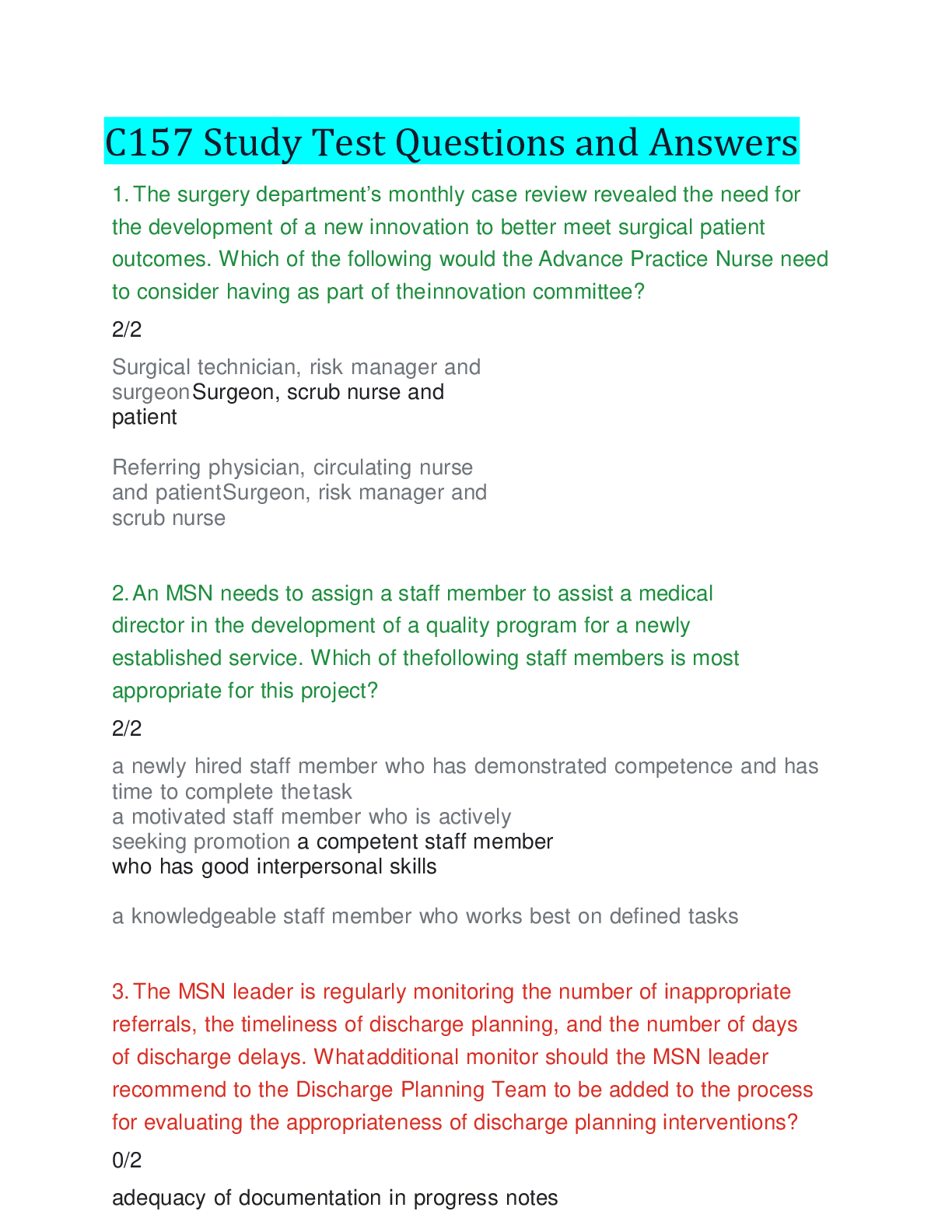
Buy this document to get the full access instantly
Instant Download Access after purchase
Add to cartInstant download
Reviews( 0 )
Document information
Connected school, study & course
About the document
Uploaded On
Jun 06, 2021
Number of pages
35
Written in
Additional information
This document has been written for:
Uploaded
Jun 06, 2021
Downloads
0
Views
56




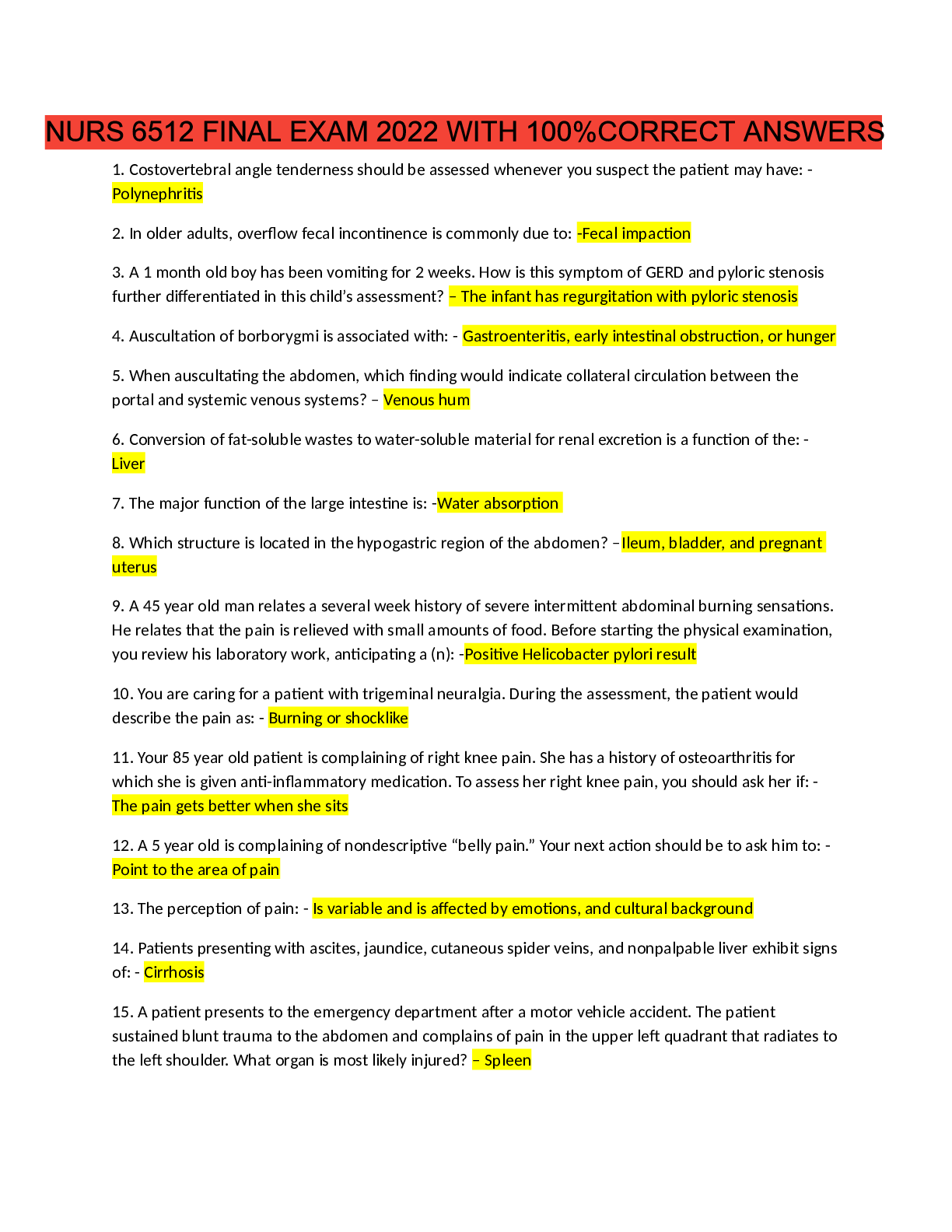
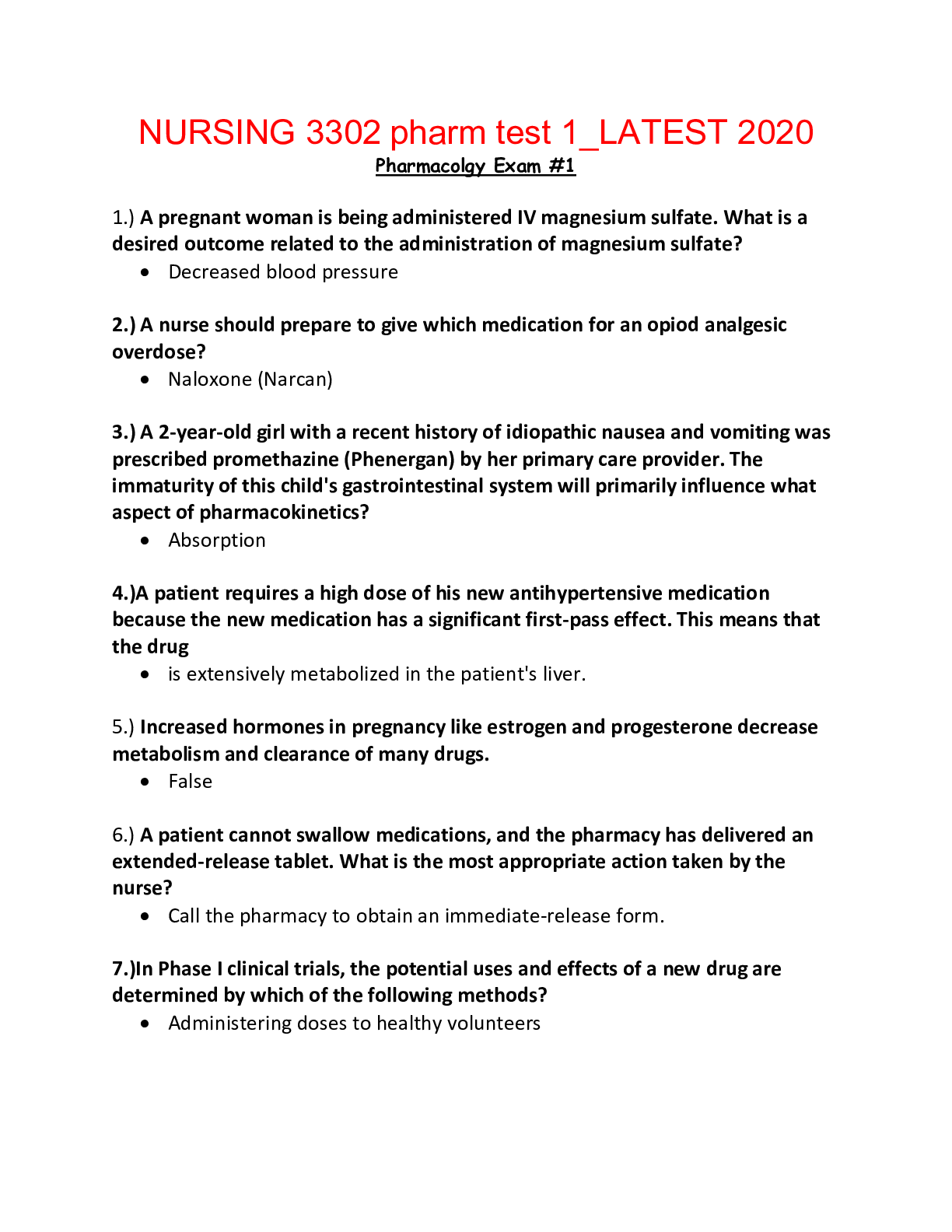
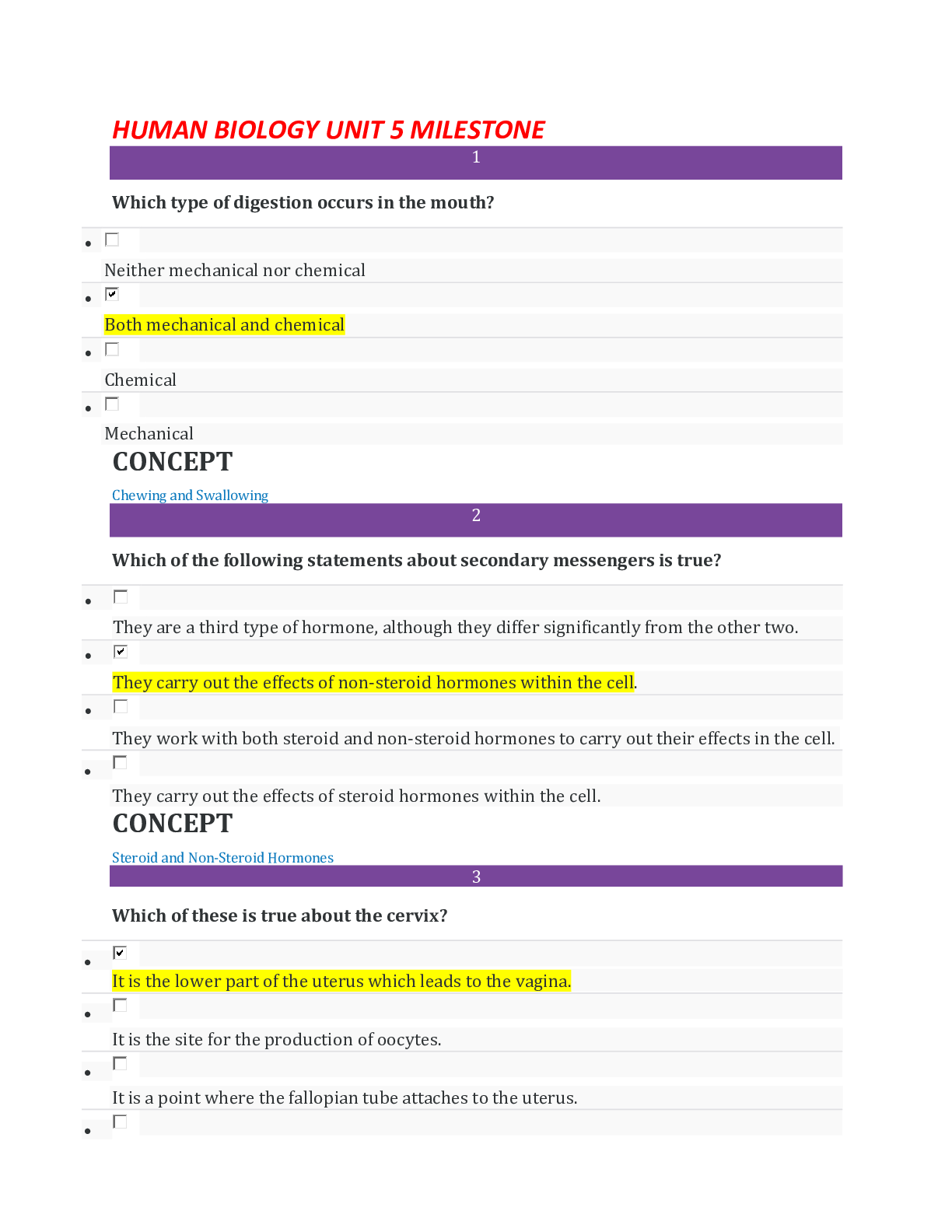

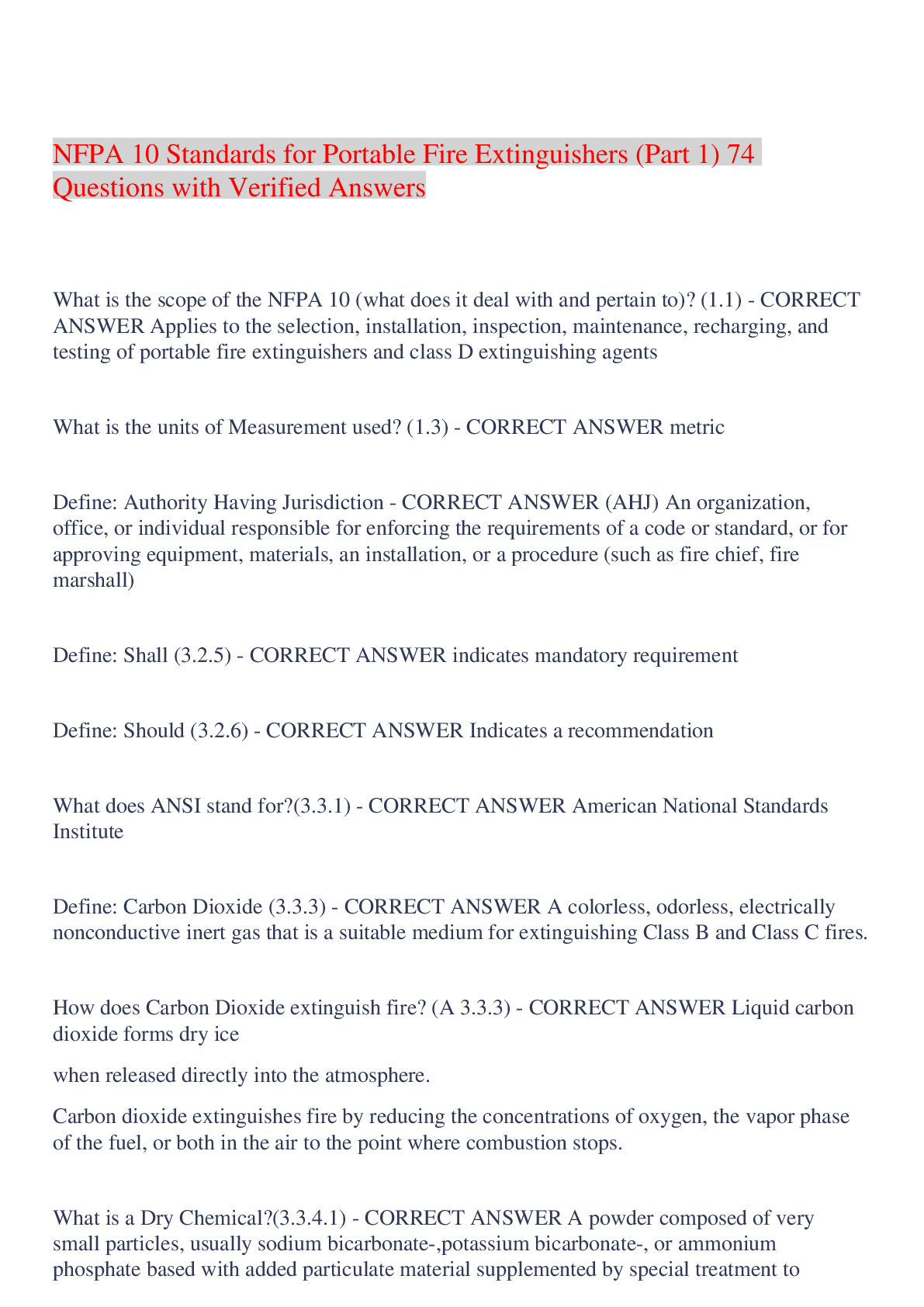
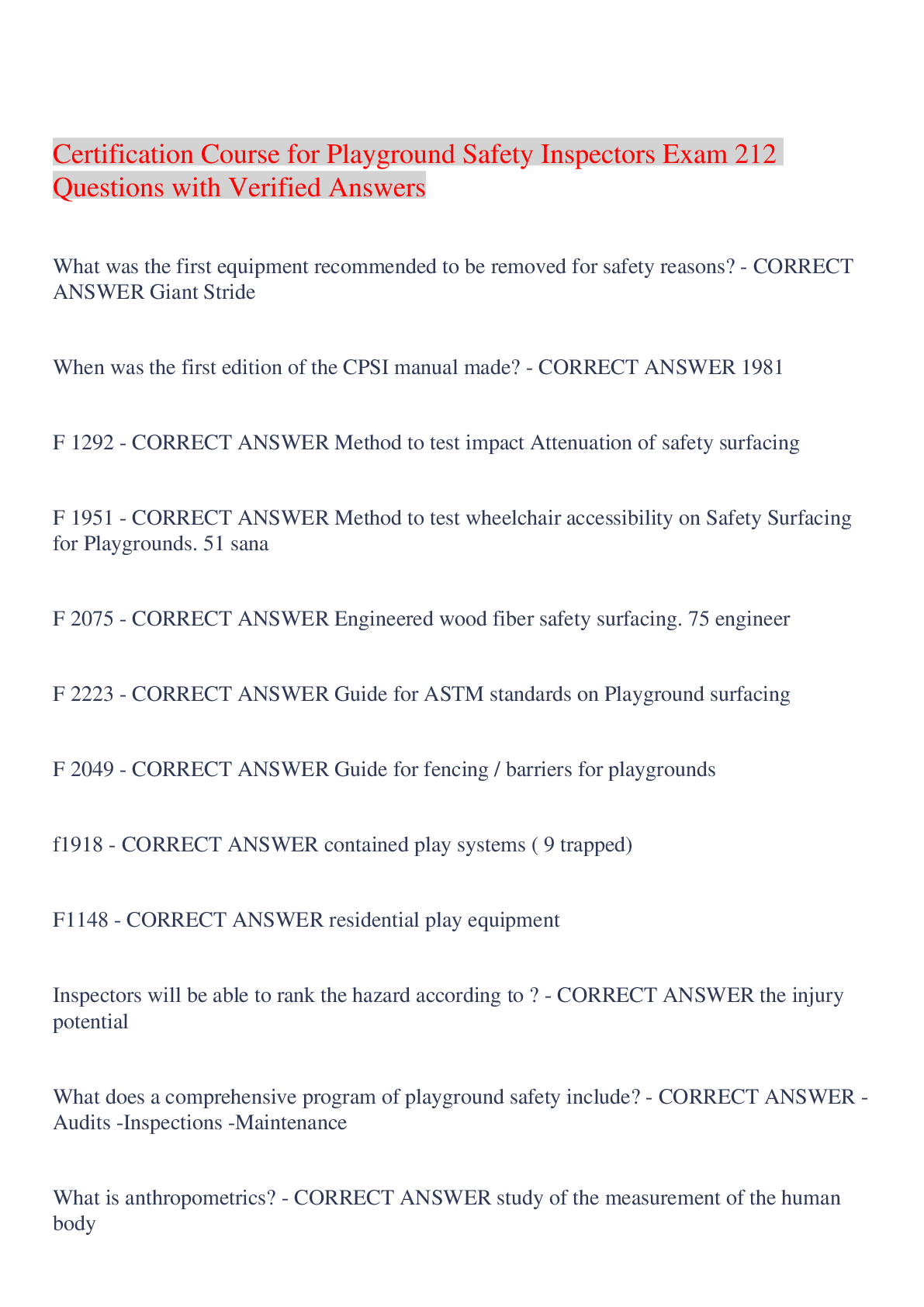

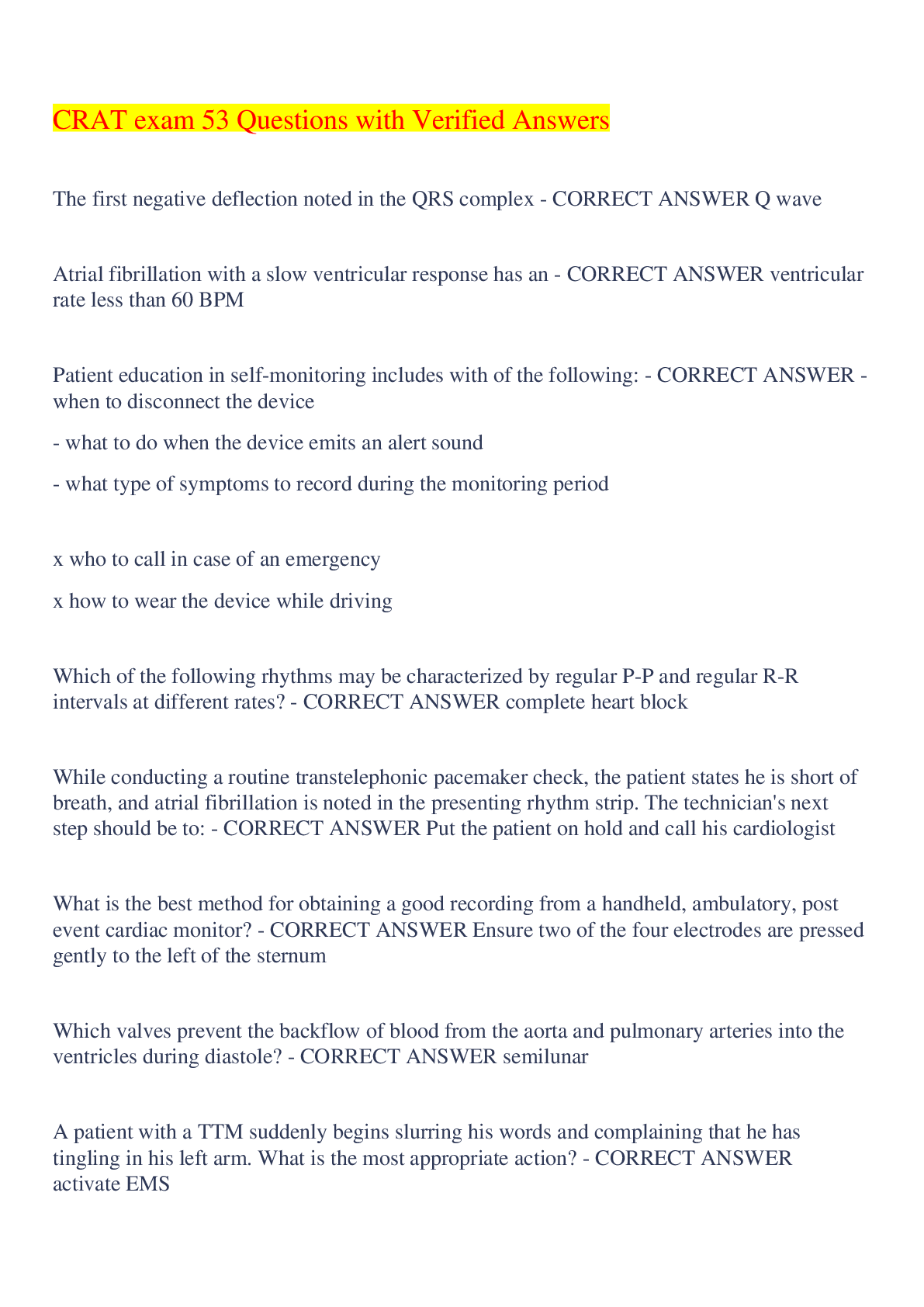
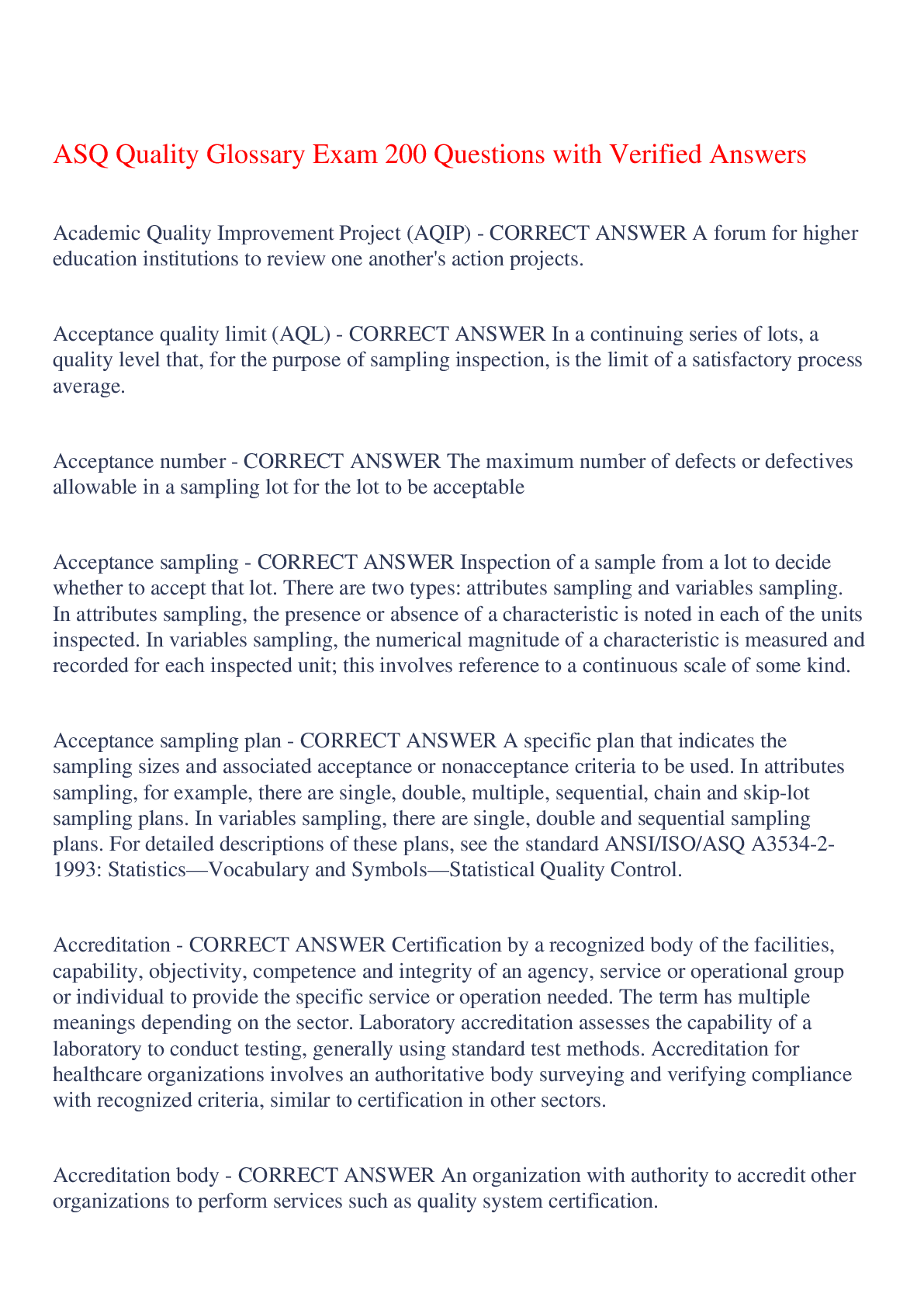

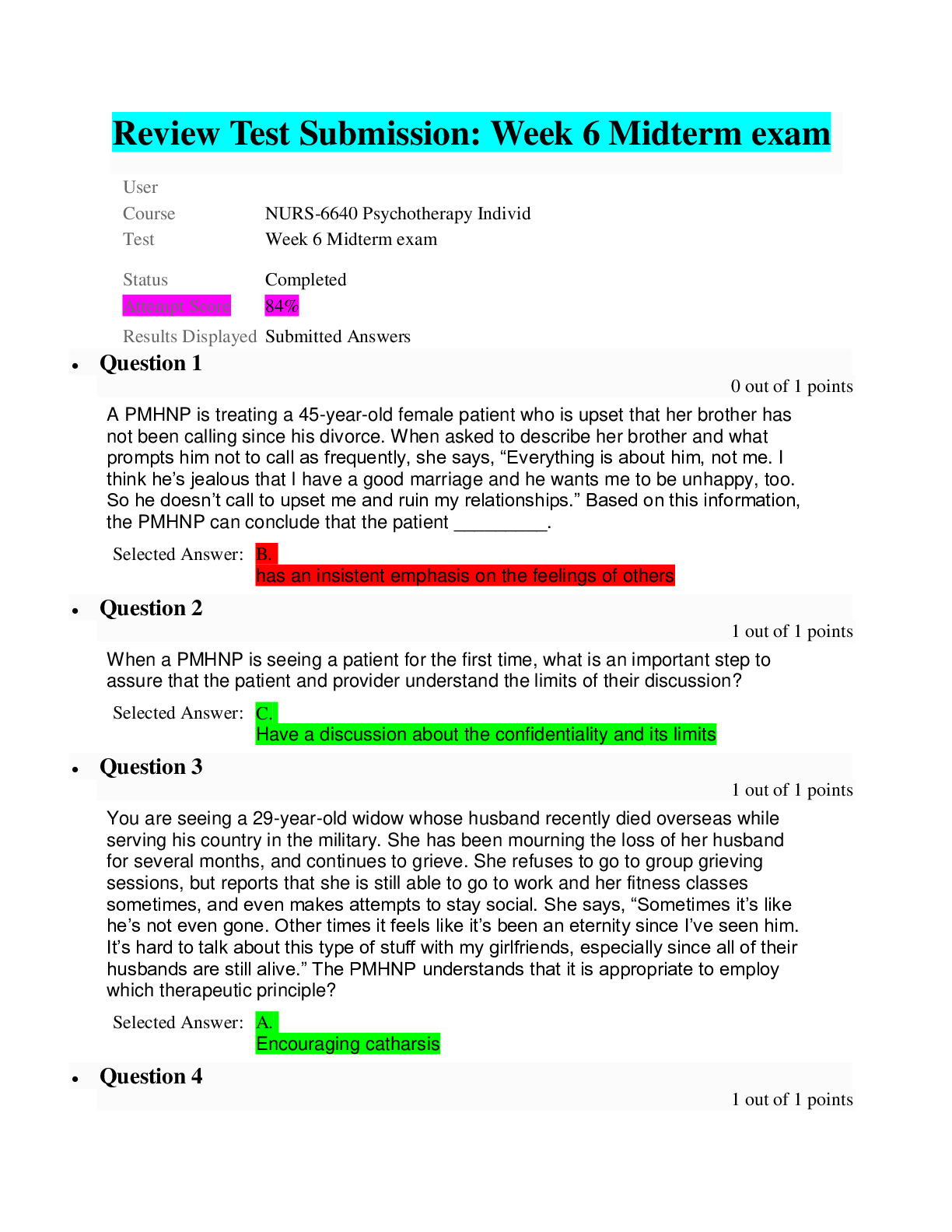
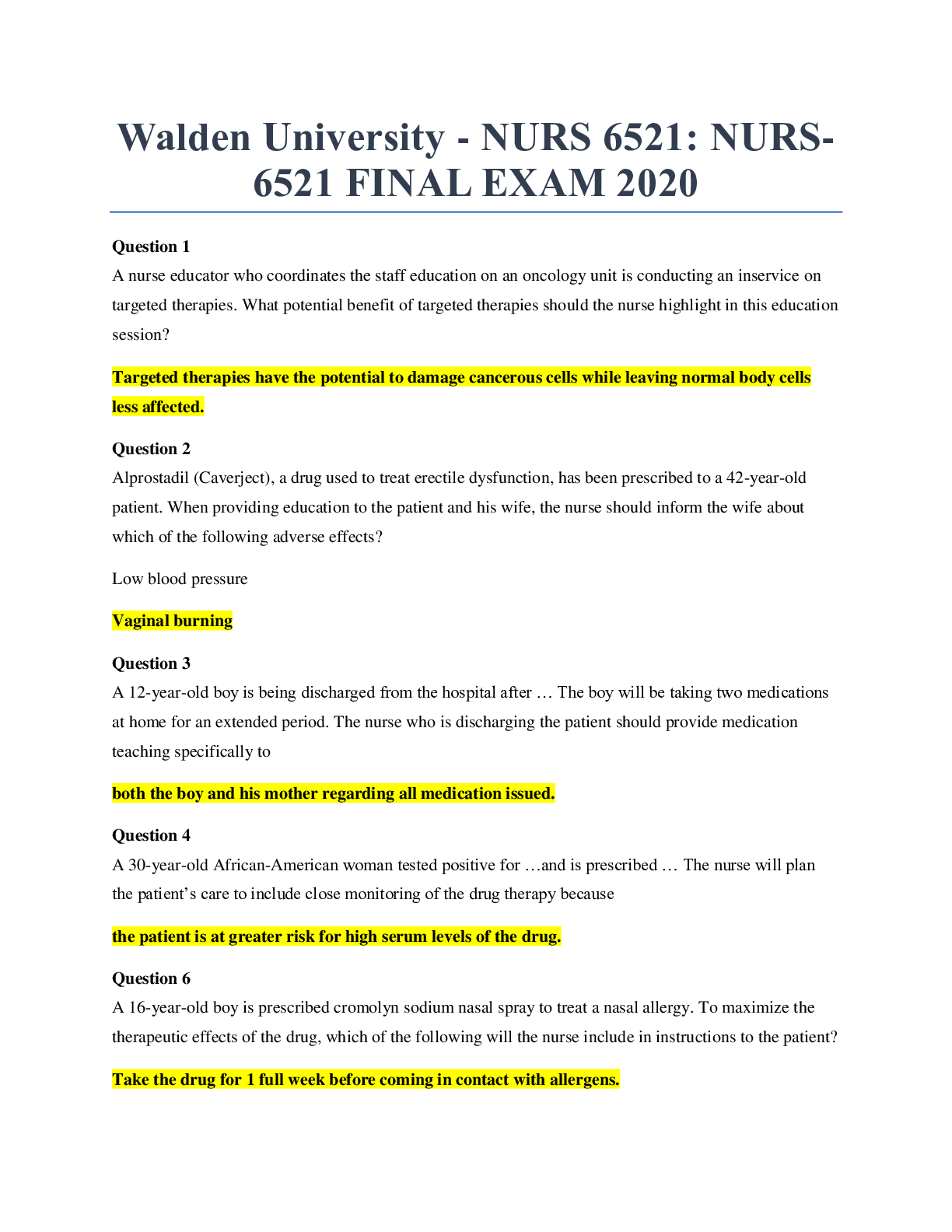
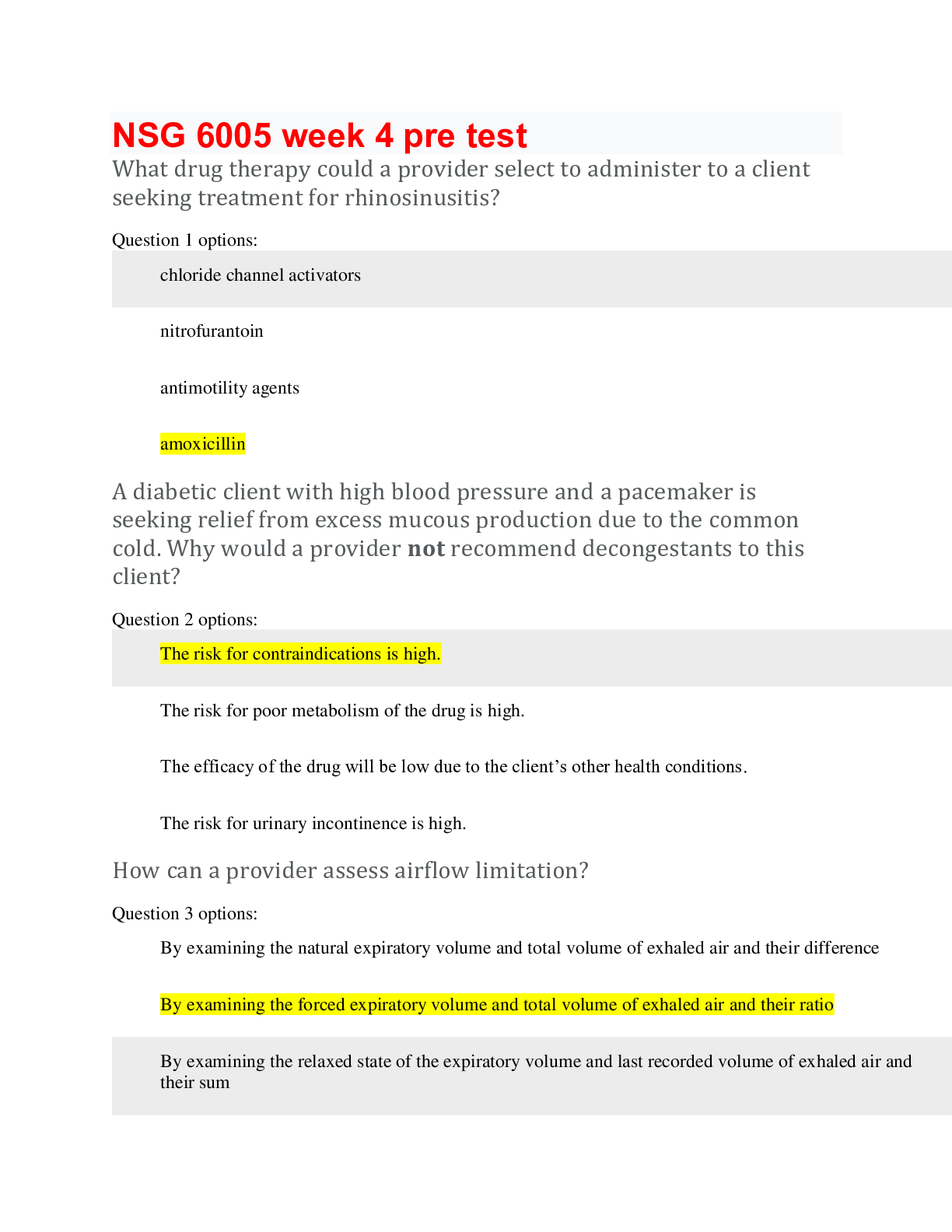
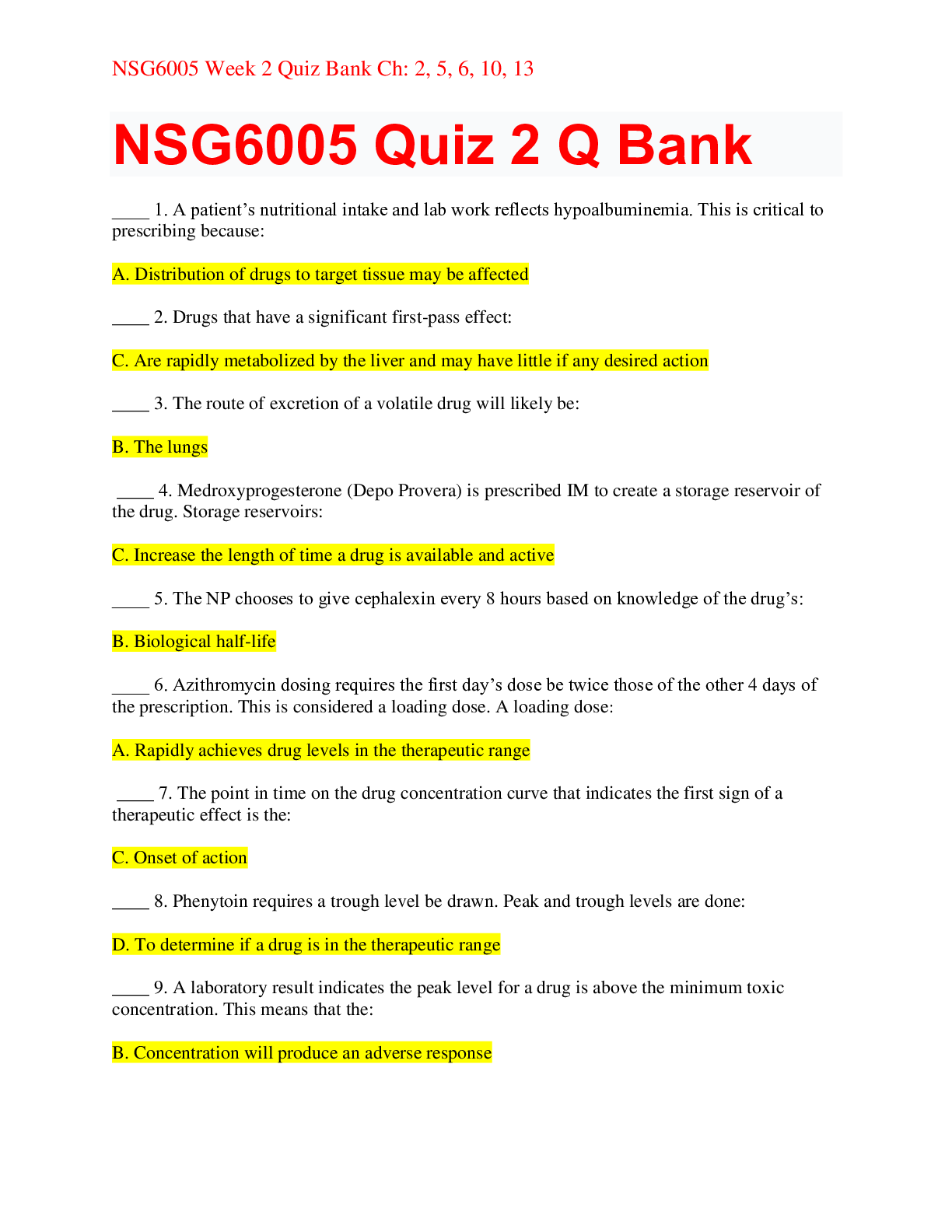

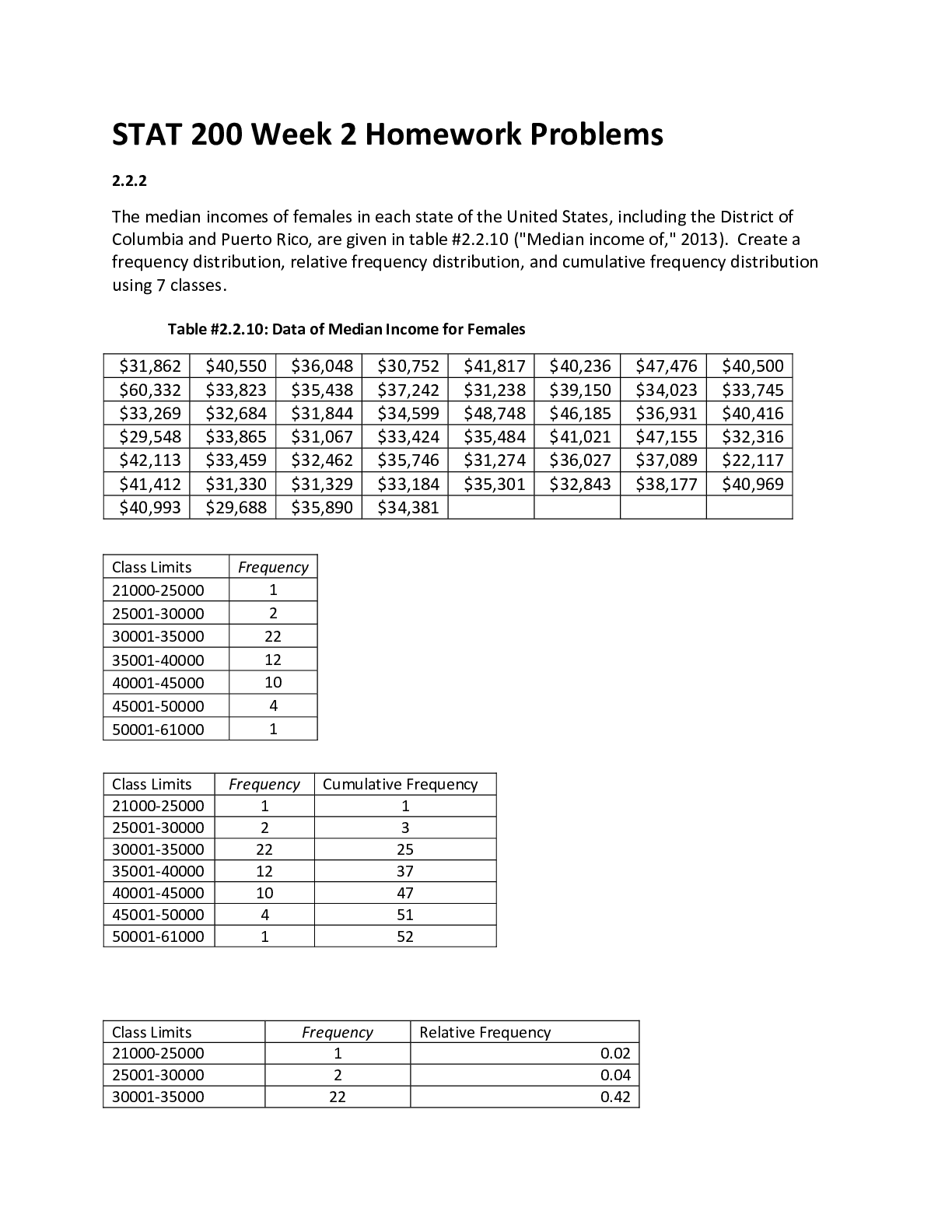
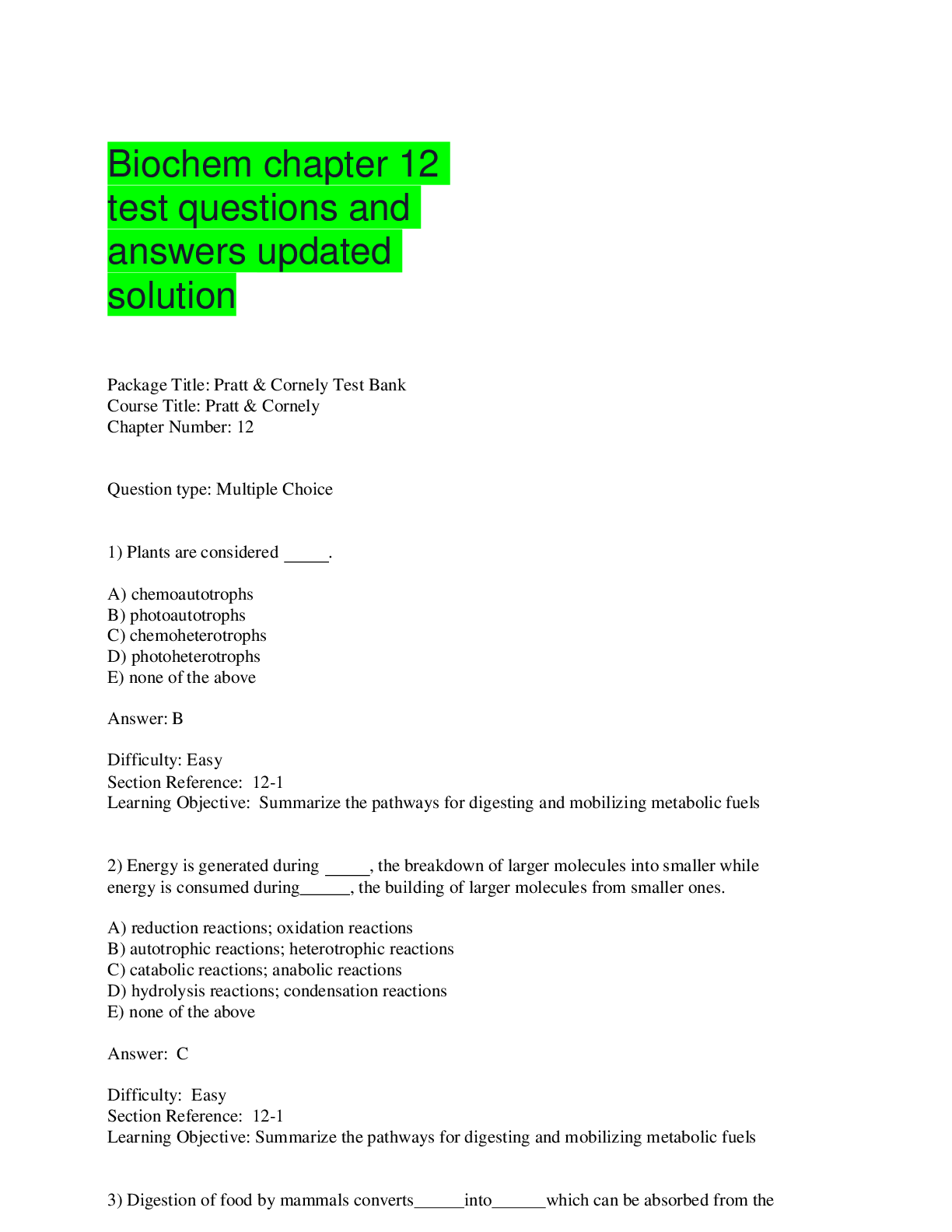
.png)
